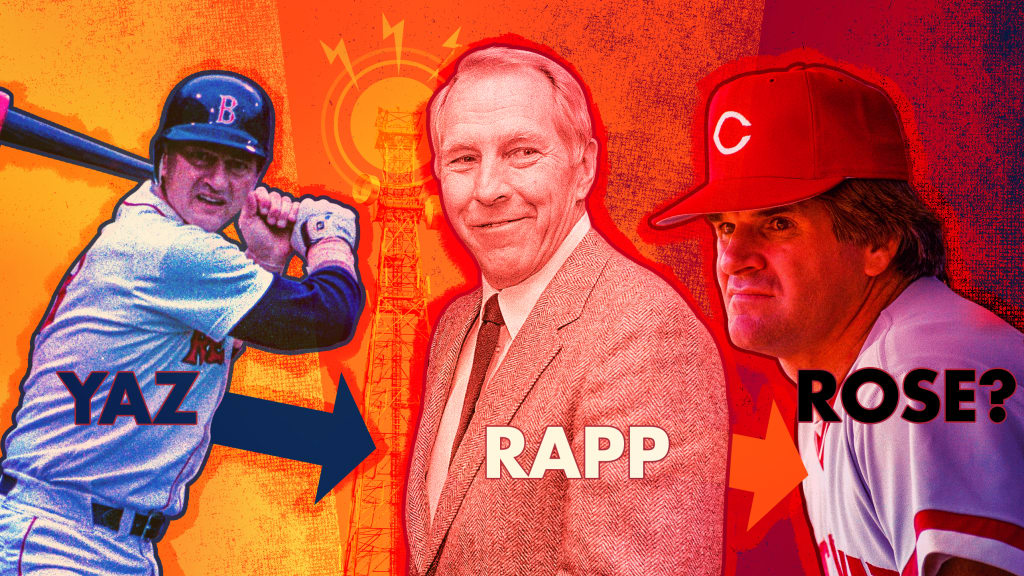
A version of this story originally ran in December 2021.
On Oct. 2, 1983, the Boston Red Sox, their fans and the baseball world said goodbye to Carl Yastrzemski. There was a whole massive production at Fenway Park for his final game, with an hour-long pregame ceremony, the retirement of his No. 8 jersey and a letter, read aloud to the crowd, from President Ronald Reagan. For a team that hadn’t reached a World Series in eight years, and hadn’t won one in 65, it was the biggest Red Sox story imaginable.
But that night, the Boston sports talk radio show “The Sports Huddle” on WHDH wasn’t talking about Carl Yastrzemski. It was talking about a relatively unknown baseball lifer named Vern Rapp. And that little four-hour show was about to change baseball history.
The 1983 Red Sox were not a good baseball team, 78-84 on the season, and over the season’s last month, and for most of the season really, the only story worth talking about was Yaz’s retirement. It reached such a critical mass that even people who loved Yaz -- which was everyone in Boston -- had begun to tire of talking about it. So, Bruce Cornblatt, then a young producer of “The Sports Huddle,” a weekly sports call-in show (and now a producer at MLB Network), thought it would be funny to gently mock all the fanfare by doing a tribute to someone else, someone far less celebrated, on the day of Yaz’s last game.
“We wanted to pay tribute to the most remote person we could,” Cornblatt told me. “We thought that might be funny for a little while.”
The problem was that Cornblatt didn’t know anyone who was retiring. So he went to the library and picked through some recent newspapers, and their sports transactions pages. He stumbled across a small note that the first-base coach in Montreal, a 55-year-old man named Vern Rapp who had previously managed the Cardinals, was set to leave his baseball career at the end of the year.
“The first-base coach of the Montreal Expos could not possibly be more obscure, at least in Boston,” Cornblatt says. “So we went with him, whoever he was.”
Thus, the ruse was set. Cornblatt and his crew decided the best way to make sure the joke would land was to play it all incredibly straight: They would run a show as if everyone in Boston, on the night of Yaz’s last game, would want to hear an earnest, extended tribute to … Vern Rapp.
They tracked down former Minor League teammates of Rapp’s, as well as friends of his from his time in St. Louis, including Cardinals broadcaster Mike Shannon, and interviewed them about how great Vern Rapp was, how much baseball would miss him. They made sure to not just OK it all with Rapp himself, but even secure his participation. But they still played it totally sober.
“It wouldn’t have worked if everybody thought it was a put-on,” Cornblatt says. “Least of all Rapp himself.”
Remarkably, Rapp agreed to spend his last night in baseball, after the final game with the Expos, talking on the phone from Montreal to some radio yahoos from Boston about his career, about taking off the uniform for the last time.
“Honest to God, we weren’t making fun of him,” Cornblatt says. “But he definitely did not understand the bit.”
Cornblatt had even written a song to send Rapp off, called “Bye Bye Vern Rapp,” set to the tune of “Bye Bye Birdie.”
Bye Bye Vern Rapp, please tell us it ain't so
Bye Bye Vern Rapp, hate to see you go ...
We'll miss your bunting signs
The way you tugged your belt
Vern, would you still have left
If you knew how we felt
It was quite the gag. But because the show took the bit so seriously, and played it so straight, something strange happened: Everyone got emotional. Shannon spoke eloquently about how much Rapp, who passed away in 2015, had meant to the Cardinals organization when he was the team’s manager, and Rapp himself, a former military man hardly known for outward emotion, broke down in tears several times looking back at his life in baseball.
Cornblatt and his fellow producers felt obliged to keep the show going, desperately looking up anyone else who had interacted with Rapp in his career. He found out that Rapp had once been a part of the Cincinnati Reds organization, so, in a rush, he called Sheldon Bender, vice president of player personnel for the Reds, who got on the air, after telling the producers “I didn’t know Vern was retiring,” and told Rapp how much he respected him.
“Vern got choked up,” Cornblatt says.
As noted, until Cornblatt had called him, Bender was unaware that Rapp was retiring. What Bender knew that Cornblatt (and Rapp) didn’t was that the Reds were dissatisfied with their current manager, Russ Nixon. And that gave Bender an idea.
****************
The general consensus on the Cincinnati Reds in 1983 was that they were overpaid, undisciplined and unworthy to be the successors to the Big Red Machine. Sparky Anderson had been gone for five years, John McNamara had already been fired, and almost all the stars from those teams, from Joe Morgan to Pete Rose to George Foster to Tony Perez, were long gone. The only Big Red Machine stalwarts left in 1983 were Johnny Bench, playing in his final season, and Dave Concepcion.
Nixon, who had won just 74 games in ’83, his only full season at the helm in Cincinnati, was seen as too relaxed, too friendly to the players, and his contract was up at the end of the season. Bender knew that general manager Bob Howsam wanted a disciplinarian, someone to whip them into gear. As it turned out, Rapp, who had once fought with Cardinals reliever Al Hrabosky about shaving his signature Fu Manchu mustache, was exactly what he was looking for.
“Vern was as serious as a straight razor,” says Hal McCoy, a longtime Reds beat reporter for the Dayton Daily News and one of the most legendary sportswriters of the last 50 years.
Bender admitted at the time that Rapp “was not a candidate until the radio show,” but when he and Howsam met with his fellow St. Louisian, they felt like they had their guy. They hired Rapp on October 5, just a couple of days after the radio gag, and prepared for the Big Red Machine to rise again.
Rapp -- who won 83 games as Cardinals skipper in 1977 before being fired 17 games into the following season -- immediately set about transforming the clubhouse, or at least trying to.
“He turned it into a high school locker room,” McCoy said. “He had signs all over the clubhouse, things like, ‘when in doubt, slide.’ Real little kid type of stuff.”
Mark Schmetzer, a beat reporter who covered the Reds for 20 years, says, “Rapp was a very sensitive guy, very sensitive to criticism, and very insistent that the Reds play like they did when he was in their Minor League system. But this was the ‘80s. The players didn’t really work that way anymore. He was a man out of his time.”
Or, more succinctly, as McCoy puts it: “They hated him.”
Greg Rhodes, the team historian for the Reds, said Rapp struggled with the team from the get-go: “The players just saw him as this cranky old man who had no business being the manager.”
McCoy said Rapp was so uncomfortable with the media that he would actually write out answers to reporters’ postgame questions on an index card and read them aloud to the room.
“By the end of it,” McCoy says, “we would just skip him entirely after the game. We just bypassed his office and went straight to the clubhouse. It was just a mess.”
The Reds were lousy that year, even worse than the year before, and Bender and Howsam, with the team at 51-70, finally admitted their radio-show-enabled mistake and fired him. Not that they told him first. In a final insult, the manager learned of his firing from … McCoy.
When McCoy learned the news, he walked onto the field and asked Rapp for comment. Rapp’s comment: “What?” He immediately stormed into the clubhouse and yelled at the players, “I’m your manager until someone tells me otherwise.” Shortly thereafter, someone did. “The players just snickered,” McCoy says. “Yeah, only time that ever happened in my career.”
So, this Boston radio show, doing an extended Yaz joke, ended up getting Vern Rapp unretired and hired by the Reds, who fired him after less than a year. A funny story, but all told, not that big of a deal. That is, until you consider who the Reds hired to replace him, and why they did so.
“The players disliked Rapp so much that it was clear the Reds needed to bring someone in the players loved,” Schmetzer said. “And there was one guy they loved more than anybody.”
Enter Pete Rose.
At the time, Rose was a flailing, declining first baseman and left fielder for a Montreal Expos team that was going nowhere. He was still chasing Ty Cobb’s hit record, but slowly: He was hitting just .259 for Montreal with a meager .295 slugging percentage. There, he was a 43-year-old guy stumbling toward history in obscurity. But in Cincinnati? In Cincinnati, he could be a legend returning. Howsam, upon firing Rapp, called the Expos and asked what it would take to get Rose not only to come play for the Reds, but be their manager. It ended up costing them utility infielder Tom Lawless.
When Rose was officially hired, the media requests for his opening press conference were so numerous that they ended up having it on the field of Riverfront Stadium. And for a while, it worked. Rose hit .365 the rest of the season, and the team was noticeably better. They then had a winning record in 1985, the year Rose broke Cobb’s record, and then again in 1986, Rose’s last year as a player.
Rose remained the manager in 1987 and '88. And then … it all came crashing down, for reasons that we know all too well at this point.
So, to recap: Vern Rapp retires. He gets a job managing the Reds because of a joke a Boston radio station made to mock Yaz hero worship. The players dislike him so much that he’s fired in place of a manager they do love. That manager is Pete Rose. And then Rose is banned from baseball for betting on games he managed for the Reds. That little radio show changed baseball history forever.
Until I spoke to him, Cornblatt did not know who replaced Rapp as manager of the Reds. “Oh my God,” he says. “That is downright scary. Wow. What a thing. This is like a Six Degrees of Kevin Bacon thing. Did I … did I get Pete Rose banned? Am I responsible for that?” Cornblatt laughs, but only a little. “What a coda to the story. Our little radio show. Wow.”
